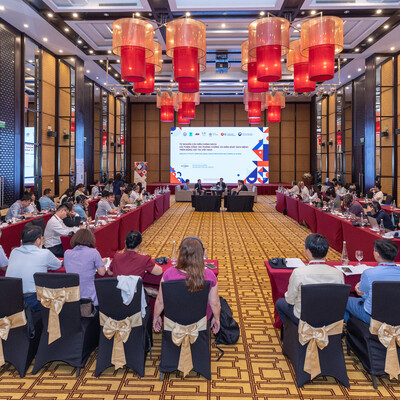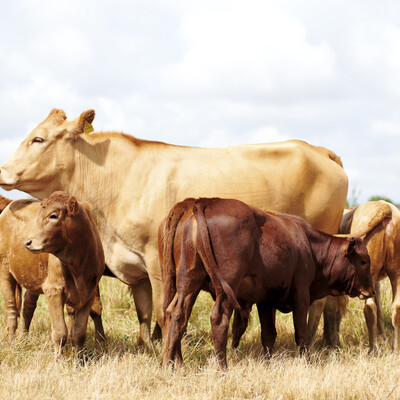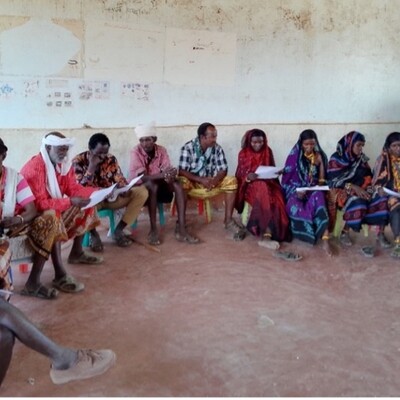
Biodiversity conservation to control zoonotic disease spillover
The International Union for Conservation of Nature and the African Wildlife Foundation organized the Africa Protected Areas Congress (APAC), the first ever continent-wide gathering of African leaders, citizens and stakeholders to discuss the role of protected areas in conserving nature, safeguarding Africa's iconic wildlife, delivering vital life-supporting ecosystem services, promoting sustainable development and preserving cultural heritage and traditions in Africa.
The International Livestock Research Institute (ILRI) was recognized as one of the 23 key global stakeholders asked to contribute to the One Health side event to address the report, Preventing the next pandemic: Zoonotic disease and how to break the chain of transmission, a joint effort by the United Nations Environment Programme (UNEP) and ILRI which identifies seven trends driving the increasing emergency of zoonotic disease.
The side event addressed two parts of the pandemic coin, first, to better understand how to break the chain of zoonotic disease transmission and second, to understand if and how animals, people and the ecosystem can better and more safely co-exist in the face of growing human populations, food insecurity and climate change.
Part I
The keynote address was delivered by Bernard Bett, a senior scientist at ILRI and team leader of the ILRI-led One Health Research Education and Outreach Centre in Africa (OHRECA), which is working to enhance Africa's One Health policies and practices.
Bett says, 'biodiversity conservation enhances the ecosystems' ability to regulate zoonosis spillovers through direct and indirect pathways, which includes increasing diversity of mammalian hosts to promote zooprophylaxis and conservation enables nature to stifle impacts associated with climate variability, such as reduced flooding which would promote vector-borne zoonoses'. He added that indirect pathways address how health ecosystems provide benefits to communities such as food, water and invasion of protected areas would be minimized, reducing activities such as bushmeat harvesting and illegal livestock grazing.
Bett says, 'biodiversity conservation enhances the ecosystems' ability to regulate zoonosis spillovers through direct and indirect pathways, which includes increasing diversity of mammalian hosts to promote zooprophylaxis and conservation enables nature to stifle impacts associated with climate variability, such as reduced flooding which would promote vector-borne zoonoses'. He added that indirect pathways address how health ecosystems provide benefits to communities such as food, water and invasion of protected areas would be minimized, reducing activities such as bushmeat harvesting and illegal livestock grazing.
ILRI's scientist, Ekta Patel, who is researching bushmeat, shares, 'social and cultural practices in communities can contribute to zoonotic spillovers. Understanding high-risk practice such as bushmeat hunting and trade for consumption or medicinal purposes is critical to mapping hotspots and determining how interventions such as conservation practices and educational and awareness campaigns can be implemented in these communities to improve livelihoods and mitigate risks associated with potential spillover'.
Part II
More than a quarter of a billion African pastoralists provide the African continent with nourishing foods and essential ecosystem services. Africa's famous wildlife populations that inhabit pastoral lands support tourism industries worth billions of dollars. In this second part, a moderated panel discussion looked at how Africa's many pastoralist herding communities can be better supported to continue their millennia-old peaceful co-existence with wildlife.
Ian Scoones, a professorial fellow at UK's Institute for Development Studies and an expert in African pastoralist and agricultural livelihoods, set the scene.
ILRI's consultant and former scientist, Henry Kiara, says, 'In any conservation effort, local communities must become our partners and not adversaries. Governments need to develop appropriate policies that prevent the destruction of rangelands such as encroachment by urban areas, agricultural practices, and other harmful developments.'
Another panelist, Chris Walzer, a wildlife veterinarian who serves as the executive director of health for the global conservation program at the Wildlife Conservation Society and tenured professor of conservation medicine at the University of Veterinary Medicine in Vienna, Austria, shared an example of peste des petits ruminants virus (PPRV) saying, 'In our world of tightly entwined wicked crises, the global eradication of PPRV highlights the need for a One Health approach that bridges livestock health, pastoralist livelihoods with wildlife health, conservation and environmental health. A sectoral approach that disregards the biodiversity impacts and neglects the climate change drivers across many of the landscapes and pastures where goats and sheep constitute the mainstay for food security and survival is doomed to fail.'
From UNEP's Head of Biodiversity, People and Landscapes Unit, Melissa De Kock says, 'There is opportunity for successful co-existence if people see wildlife as value for them and not just in competition for grazing and water but something they can benefit from through, for example, getting meat. Sustainable offtake of wild meat for own consumption has worked in some areas. It requires very careful quota setting based on sound monitoring data and adaptative management, considering climate change and other external pressures not necessarily related to harvesting.'
These messages demonstrate the continued need for an integrated approach to addressing climate, biodiversity, health and conflict nexus of issues to include all stakeholders.
Read more about our work here:
Preventing the next pandemic: ILRI UNEP report
Impact assessment confirms participatory rangeland management's positive impact on rangelands and pastoral communities
ILRI's Kapiti research station and wildlife conservancy
Photo credit: APAC 2022 Signage outside the Kigali Convention Centre by Elizabeth Kaniwabo, CTPH_UG.
















